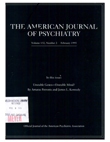Depression and neuropsychological performance in asymptomatic HIV infection
Abstract
OBJECTIVE: The authors examined the effect of depression on neuropsychological performance in HIV-infected men. Previous studies have suggested that depression may account for the neuropsychological abnormalities observed in some patients with HIV infection, but few studies have specifically examined this question. METHOD: An extensive neuropsychological test battery was administered to 121 HIV- seropositive asymptomatic men and 42 HIV-seronegative comparison subjects. The seropositive subjects were grouped into depressed and non- depressed groups on the basis of scores on the Beck Depression Inventory, Hamilton Rating Scale for Depression, and Structured Clinical Interview for DSM-III-R. RESULTS: Statistical comparisons revealed very few measures on which the depressed seropositive subjects scored significantly worse than either of the nondepressed comparison groups. The nondepressed seropositive group differed consistently from the seronegative comparison subjects on measures of verbal memory and dexterity. CONCLUSIONS: These data indicate that the subtle neuropsychological abnormalities observed in some asymptomatic HIV- seropositive subjects cannot be attributed to depression. These data also indicate the advantages of a multifaceted approach to assessment of depression.
Access content
To read the fulltext, please use one of the options below to sign in or purchase access.- Personal login
- Institutional Login
- Sign in via OpenAthens
- Register for access
-
Please login/register if you wish to pair your device and check access availability.
Not a subscriber?
PsychiatryOnline subscription options offer access to the DSM-5 library, books, journals, CME, and patient resources. This all-in-one virtual library provides psychiatrists and mental health professionals with key resources for diagnosis, treatment, research, and professional development.
Need more help? PsychiatryOnline Customer Service may be reached by emailing [email protected] or by calling 800-368-5777 (in the U.S.) or 703-907-7322 (outside the U.S.).



